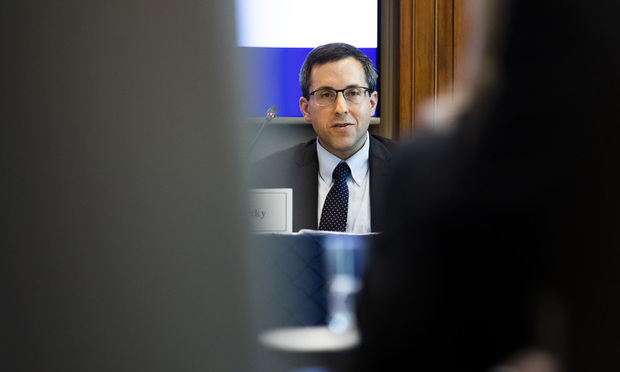Justices Scrap State Residency Requirements for Alcohol Retail Licenses
Justice Samuel Alito Jr. said Tennessee's two-year residency requirement “blatantly favors the state's residents.”
June 26, 2019 at 10:55 AM
4 minute read
 Wine bottles. Credit: Mike Scarcella/ NLJ
Wine bottles. Credit: Mike Scarcella/ NLJ
The Constitution's commerce clause prohibits Tennessee from imposing a residency requirement on applicants seeking retail licenses to sell alcoholic beverages, the U.S. Supreme Court ruled on Wednesday in a case affecting the locations and types of alcohol available to consumers.
In Tennessee Wine and Spirits Retailers Association v. Thomas, Justice Samuel Alito Jr., writing for a 7-2 majority, said, “Because Tennessee's two-year residency requirement for retail license applicants blatantly favors the state's residents and has little relationship to public health and safety, it is unconstitutional.”
The residency requirement, Alito added, is not shielded by the 21st Amendment which gives each state leeway in choosing the alcohol-related public health and safety measures that its citizens desire. Section 2 of that amendment, he wrote, “is not a license to impose all manner of protectionist restrictions on commerce in alcoholic beverages.”
Nearly every state has some form of residency requirement for retail liquor license applicants.
Justice Neil Gorsuch, joined by Justice Clarence Thomas, dissented, writing that the nation has adopted two separate constitutional amendments over time to adjust alcohol's role in society. “But through it all, one thing has always held true: States may impose residency requirements on those who seek to sell alcohol within their borders to ensure that retailers comply with local laws and norms.”
For the first time, he added, “the Court claims to have discovered a duty and power to strike down laws like these as unconstitutional. Respectfully, I do not see it.”
At the center of the conflict, which held potential national economic repercussions, was Tennessee's two-year residency requirement for retail liquor licenses, a law that dates to 1939. The U.S. Court of Appeals for the Sixth Circuit held that the two-year requirement discriminated against out-of-state retailers. The Constitution's dormant commerce clause prohibits state legislation that discriminates against interstate commerce.
During arguments in January, the justices appeared to struggle to reconcile the 21st Amendment's grant of near total authority to states to regulate the distribution of alcohol within their borders with the Constitution's competing command that states not discriminate against out-of-state economic interests.
 Shay Dvoretzky, partner with Jones Day, speaking at a Chamber event on Thursday, June 21, 2019. Credit: Diego M. Radzinschi / NLJ
Shay Dvoretzky, partner with Jones Day, speaking at a Chamber event on Thursday, June 21, 2019. Credit: Diego M. Radzinschi / NLJJones Day partner Shay Dvoretzky, counsel to the Tennessee Wine & Spirits Retailers Association, a trade association, argued that the text of the 21st Amendment, which ended Prohibition, and the pre-Prohibition history of state regulations, supported the Tennessee residency requirement.
“There is no dormant commerce clause problem as long as the state treated in-state and out-of-state [retailers] alike,” which Tennessee does, argued Dvoretzky.
But Justice Elena Kagan said Tennessee was at “the end of the spectrum” of states that have residency requirements. “Isn't that clearly protectionism,” she asked Illinois Solicitor General David Franklin, who shared argument time with Dvoretzky on behalf of 36 states.
Franklin conceded a residency requirement at some point could be arbitrary under the 14th Amendment. But, he told Kagan, his opponents “are asking the court to treat alcohol like any other product and it's not.”
Sidley Austin partner Carter Phillips, representing the national chain Total Wine, countered that the “core principle” at stake was non-discrimination. “We are being discriminated against,” he said. “The state has the burden to justify it. There is no non-discriminatory purpose. The state in this case said absolutely nothing and the reason is clear—the sole purpose is to be exclusively protectionist.”
But alcohol is different, said Justices Neil Gorsuch, adding, “We have the 21st Amendment.”
Besides Total Wine, the other challenger to the residency requirement is a family that bought a Memphis liquor store and moved from Utah to Tennessee for a healthier climate for their disabled daughter. The family is represented by the Institute for Justice's Michael Bindas.
The court's ruling is posted below:
Read more:
'A Cocktail-by-Cocktail History of the Eras of the Supreme Court'
Justices Are Urged to Protect States' Liquor Markets
This content has been archived. It is available through our partners, LexisNexis® and Bloomberg Law.
To view this content, please continue to their sites.
Not a Lexis Subscriber?
Subscribe Now
Not a Bloomberg Law Subscriber?
Subscribe Now
NOT FOR REPRINT
© 2025 ALM Global, LLC, All Rights Reserved. Request academic re-use from www.copyright.com. All other uses, submit a request to [email protected]. For more information visit Asset & Logo Licensing.
You Might Like
View All
High Court Rejects 'Heightened' Standard for Employers Defending FLSA Cases

3rd Circuit Strikes Down NLRB’s Monetary Remedies for Fired Starbucks Workers

K&L Gates Secures $10.5M Verdict for Washington Meat Retailer in Lawsuit Over 'Boneless' Chicken Product

Frozen-Potato Producers Face Profiteering Allegations in Surge of Antitrust Class Actions
3 minute readTrending Stories
- 1'A Death Sentence for TikTok'?: Litigators and Experts Weigh Impact of Potential Ban on Creators and Data Privacy
- 2Bribery Case Against Former Lt. Gov. Brian Benjamin Is Dropped
- 3‘Extremely Disturbing’: AI Firms Face Class Action by ‘Taskers’ Exposed to Traumatic Content
- 4State Appeals Court Revives BraunHagey Lawsuit Alleging $4.2M Unlawful Wire to China
- 5Invoking Trump, AG Bonta Reminds Lawyers of Duties to Noncitizens in Plea Dealing
Who Got The Work
J. Brugh Lower of Gibbons has entered an appearance for industrial equipment supplier Devco Corporation in a pending trademark infringement lawsuit. The suit, accusing the defendant of selling knock-off Graco products, was filed Dec. 18 in New Jersey District Court by Rivkin Radler on behalf of Graco Inc. and Graco Minnesota. The case, assigned to U.S. District Judge Zahid N. Quraishi, is 3:24-cv-11294, Graco Inc. et al v. Devco Corporation.
Who Got The Work
Rebecca Maller-Stein and Kent A. Yalowitz of Arnold & Porter Kaye Scholer have entered their appearances for Hanaco Venture Capital and its executives, Lior Prosor and David Frankel, in a pending securities lawsuit. The action, filed on Dec. 24 in New York Southern District Court by Zell, Aron & Co. on behalf of Goldeneye Advisors, accuses the defendants of negligently and fraudulently managing the plaintiff's $1 million investment. The case, assigned to U.S. District Judge Vernon S. Broderick, is 1:24-cv-09918, Goldeneye Advisors, LLC v. Hanaco Venture Capital, Ltd. et al.
Who Got The Work
Attorneys from A&O Shearman has stepped in as defense counsel for Toronto-Dominion Bank and other defendants in a pending securities class action. The suit, filed Dec. 11 in New York Southern District Court by Bleichmar Fonti & Auld, accuses the defendants of concealing the bank's 'pervasive' deficiencies in regards to its compliance with the Bank Secrecy Act and the quality of its anti-money laundering controls. The case, assigned to U.S. District Judge Arun Subramanian, is 1:24-cv-09445, Gonzalez v. The Toronto-Dominion Bank et al.
Who Got The Work
Crown Castle International, a Pennsylvania company providing shared communications infrastructure, has turned to Luke D. Wolf of Gordon Rees Scully Mansukhani to fend off a pending breach-of-contract lawsuit. The court action, filed Nov. 25 in Michigan Eastern District Court by Hooper Hathaway PC on behalf of The Town Residences LLC, accuses Crown Castle of failing to transfer approximately $30,000 in utility payments from T-Mobile in breach of a roof-top lease and assignment agreement. The case, assigned to U.S. District Judge Susan K. Declercq, is 2:24-cv-13131, The Town Residences LLC v. T-Mobile US, Inc. et al.
Who Got The Work
Wilfred P. Coronato and Daniel M. Schwartz of McCarter & English have stepped in as defense counsel to Electrolux Home Products Inc. in a pending product liability lawsuit. The court action, filed Nov. 26 in New York Eastern District Court by Poulos Lopiccolo PC and Nagel Rice LLP on behalf of David Stern, alleges that the defendant's refrigerators’ drawers and shelving repeatedly break and fall apart within months after purchase. The case, assigned to U.S. District Judge Joan M. Azrack, is 2:24-cv-08204, Stern v. Electrolux Home Products, Inc.
Featured Firms
Law Offices of Gary Martin Hays & Associates, P.C.
(470) 294-1674
Law Offices of Mark E. Salomone
(857) 444-6468
Smith & Hassler
(713) 739-1250










